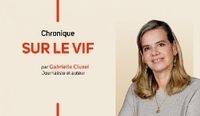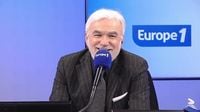On March 28, 2025, the popular French television host Pascal Praud took to the airwaves for a two-hour discussion that delved into a topic that has captivated audiences for generations: the fascination with criminal cases. Joined by notable guests including journalist Christophe Hondelatte, entrepreneur Pierre-Edouard Stérin, and journalist Gabrielle Cluzel, Praud led a thoughtful exploration of why crime stories resonate so deeply with the public.
During the broadcast, Praud and his guests examined the complex relationship between crime and society, pondering what it is that draws people to criminal narratives. Hondelatte, known for his extensive work in journalism and television, offered insights into the psychological aspects of crime reporting and its impact on viewers. "Crime stories evoke a range of emotions, from fear to fascination, and they often reflect our deepest societal concerns," he noted.
Listeners were encouraged to participate in the discussion by calling in at 01.80.20.39.21, a non-premium number, or by engaging on the social media platforms of Europe 1, the radio station hosting the show. This interactive element allowed the audience to share their opinions and engage in a wider debate about the themes presented during the program.
As the conversation unfolded, the guests touched on various high-profile criminal cases that have made headlines in France and beyond. They discussed how these stories not only capture public attention but also spark discussions about justice, morality, and societal values. Praud emphasized that the media plays a crucial role in shaping public perception of crime, often sensationalizing events to draw viewers in.
In a related segment, Gabrielle Cluzel brought a different perspective to the discussion by highlighting the Prime Minister's recent use of the term 'conclave' to describe consultations regarding retirement reforms. This choice of language, she argued, reflects a broader trend in which political discourse increasingly adopts religious terminology to convey a sense of gravity and importance.
Cluzel pointed out that this is not an isolated occurrence. She referenced a similar instance in 2022 when TF1 described the summer universities of La France Insoumise (LFI) as the 'grand-messe des Insoumis.' Such terminology, while perhaps intended to elevate the discourse, raises questions about the appropriateness of conflating sacred language with secular political events.
Moreover, Cluzel recalled a 2018 instance where Radio France referred to Emmanuel Macron's message to the Association of the Presidential Press as 'Urbi et Orbi,' a phrase traditionally associated with papal addresses. This crossover into religious vernacular serves to underscore the solemnity of political moments, yet it also invites scrutiny regarding the implications of such language.
As the show continued, the guests engaged in a lively debate about the implications of these linguistic choices. Some argued that using religious language in political contexts could alienate certain segments of the population, while others believed it could foster a sense of unity and shared purpose.
Throughout the broadcast, Praud maintained a dynamic and engaging tone, encouraging his guests to share their thoughts while also inviting the audience to contribute. The mix of crime discussion and political analysis made for a compelling program that resonated with listeners.
Reflecting on the day's discussions, Praud concluded that both crime and political rhetoric are intertwined in their ability to captivate and mobilize public interest. He noted that as society grapples with complex issues—be it through the lens of criminality or the language of politics—there remains a profound need for dialogue and understanding.
In a world where sensationalism often overshadows substance, programs like Praud's provide a necessary platform for nuanced conversations about the issues that matter most to society. The interplay between crime narratives and political discourse highlights the importance of critical engagement with the media and the narratives that shape our understanding of the world.
Ultimately, the discussions on March 28, 2025, served as a reminder of the power of media to influence public perception and the responsibility that comes with it. As audiences continue to tune in to crime stories and political debates alike, the need for thoughtful, informed dialogue remains paramount.





